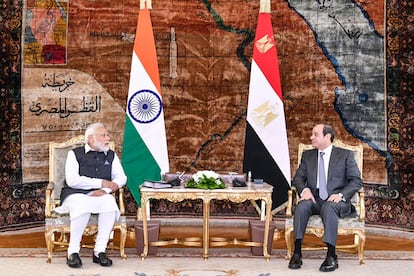Egypt’s president gives highest honor to visiting Indian prime minister as ties improve
Egyptian President Abdel Fattah el-Sissi and Indian Prime Minister Narendra Modi signed a declaration elevating Egyptian-Indo ties to a “strategic partnership,” which means the two nations agreed to intensify their cooperation and hold periodic talks

Egyptian President Abdel Fattah el-Sissi on Sunday bestowed Indian Prime Minister Narendra Modi with Egypt’s highest honor as the two countries tightened their partnership.
El-Sissi welcomed Modi at the presidential palace in Cairo with the Order of the Nile, the Egyptian presidency said in a statement. The leaders signed a declaration elevating Egyptian-Indo ties to a “strategic partnership,” which means the two nations agreed to intensify their cooperation and hold periodic talks, the statement said.
Egypt and India share deep ties that date back to the 1950s, when they played key roles in founding the Non-Aligned Movement, which sought an alternative path at the height of the Cold War.
Modi, who arrived in Cairo on Saturday, is the first Indian prime minister to pay a state visit to Egypt in more than two decades. His two-day stop came six months after el-Sissi was in New Delhi as an official guest at India’s Republic Day parade.
Modi also invited the Egyptian leader to attend a summit of the Group of 20 leading rich and developing countries, which India will host in September.
Following his talks with el-Sissi, Modi visited the famed Pyramids of Giza and a historic mosque, Cairo’s Al-Hakim, which was recently renovated with the help of the India-based Dawoodi Bohra community. He also paid tribute to Indian soldiers who died in World War I and are buried in the Heliopolis War Cemetery in Cairo.
Modi’s trip to Egypt has focused on strengthening bilateral ties. The prime minister said both countries have been moving swiftly to increase bilateral trade to $12 billion annually within five years.
Trade exchange between the two nations reached $6 billion in last year, a 13.7% increase from $5.3 billion in 2021, according to Egypt’s statistics bureau.
The two governments also signed agreements in the fields of agriculture, archaeology, antiquities and competition law, said Arindam Bagchi, a spokesman for India’s external affairs ministry.
“My visit to Egypt was a historic one. It will add renewed vigor to India-Egypt relations and will benefit the people of our nations,” Modi wrote on Twitter before departing to New Delhi.
Earlier this year, both countries agreed to boost trade cooperation. India, the world’s most populous country, is one of the top five importers of Egyptian products, including crude oil and liquefied natural gas, salt, cotton, inorganic chemicals and oilseeds. Major Indian exports to Egypt include cotton yarn, coffee, herbs, tobacco, lentils, vehicle parts, ships, boats and electrical machinery.
El-Sissi and Modi, who came to power in their countries in 2014, have in recent years cultivated a closer relationship. Over the last 16 months, they have resisted pressure from the West to condemn the Russian war in Ukraine. Both Egypt and India have decades-old ties with the Kremlin.
“There is a change in the global geopolitical and geoeconomic atmosphere wherein both countries wish to play a defining role,” India’s Defense Minister Rajnath Singh said during a visit to Cairo in September. “Egypt’s geostrategic location acts as a connecting link between Africa, West Asia, the Mediterranean, and Europe and is also an important country from the Indo-Pacific point of view.”
Modi arrived from the United States, where he held talks with President Joe Biden and top administration officials, addressed Congress and met with top American executives.
His meeting with el-Sissi came as global attention focused on a brief rebellion by the head of the Wagner Group, seen as the greatest challenge to Russian President Vladimir Putin in his more than two decades in power. Neither leader commented on the Russian crisis.
Sign up for our weekly newsletter to get more English-language news coverage from EL PAÍS USA Edition
Tu suscripción se está usando en otro dispositivo
¿Quieres añadir otro usuario a tu suscripción?
Si continúas leyendo en este dispositivo, no se podrá leer en el otro.
FlechaTu suscripción se está usando en otro dispositivo y solo puedes acceder a EL PAÍS desde un dispositivo a la vez.
Si quieres compartir tu cuenta, cambia tu suscripción a la modalidad Premium, así podrás añadir otro usuario. Cada uno accederá con su propia cuenta de email, lo que os permitirá personalizar vuestra experiencia en EL PAÍS.
¿Tienes una suscripción de empresa? Accede aquí para contratar más cuentas.
En el caso de no saber quién está usando tu cuenta, te recomendamos cambiar tu contraseña aquí.
Si decides continuar compartiendo tu cuenta, este mensaje se mostrará en tu dispositivo y en el de la otra persona que está usando tu cuenta de forma indefinida, afectando a tu experiencia de lectura. Puedes consultar aquí los términos y condiciones de la suscripción digital.








































